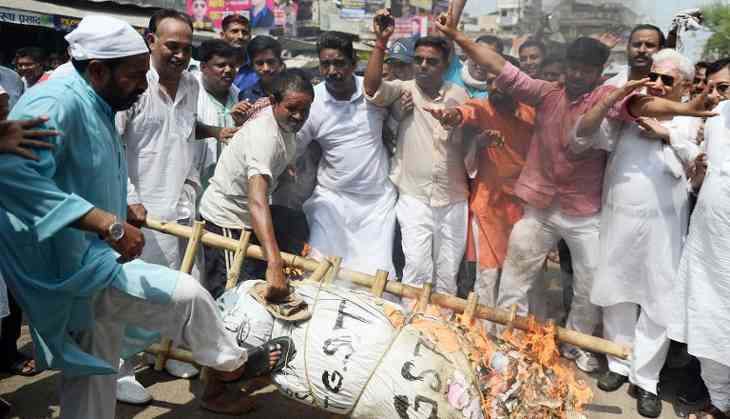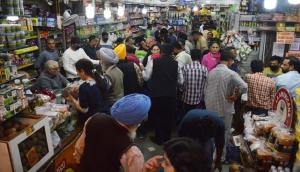Traders slam GST: 'After note ban, this is the next attack on us'

True his style of coming up new names, Prime Minister Narendra Modi ushered in the Goods and Services Tax (GST) calling it the “Good and Simple Tax”. But on the first day of it's implementation, this seems little more than a cruel joke for traders. Plagued by confusion on tax rates, traders are are trying hard to understand what precisely is “simple” about this tax.
Evoking memories of Jawaharlal Nehru’s “tryst with destiny”, Modi at Parliament’s Central Hall said the GST was good because there will be no tax on tax and simple because there will be only one form of tax.
But traders across the national capital are at loss trying to decipher the multiple tax rates and filing procedures and say they find nothing ‘good’ or ‘simple’ in the GST.
Most of the traders' associations Catch spoke to, said that they are confused about the new rules and claimed that their business has suffered.
All Delhi Computers Traders Association President, Mahendra Agarwal called the government preparedness to be a farce.
“The simplicity is only in Modi’s words. The rules are complex and there has been hardly any effort to explain them to traders,” he said.
Slamming the government, he added, “All the claims of preparedness by the government, are a farce. When we are still uncertain about the various tax rates and billing or filing procedures how we will explain this to customers?”
“I have only heard about workshops on GST being held but I haven’t come across anyone who has attended them,” he said.
Besides problems in registration under the GST, Agarwal said the traders were confused and unaware about invoicing and filing returns.
“Most of the shops are open but no business is being done because we all are running around trying to figure out what to do,” he said
Federation of Delhi Footwear Association president Surinder Singh Ralli compared GST with Modi’s another ambitious but widely criticised demonetisation move.
“After demonetisation, GST is the next attack on traders like us. The only difference is demonetisation was sudden but we all knew that GST is going to be implemented. But the effect is same, uncertainty and confusion and adverse effect on business,” said Ralli.
Far from the Prime Minister’s claims of the note-ban impacting terror funding and eliminating black money, demonetisation widely impacted the economy with GDP growth rate slumping down to 6.1 per cent in the January-March period.
Traders feel GST will also impact the economy adversely.
“The government is still counting the benefits of demonetisation and we can see none. Maybe we will get to see benefits of the GST. But as of now, business has been badly affected,” said Ralli.
GST’s penal provisions also have the traders worried about the return of the inspector raj.
“As traders are we supposed to focus on doing business or filing returns? Isn’t it the government’s job to verify if the filings are correct? One wrong filing and you may land up in jail,” said Delhi Electrical Traders Association secretary Ravinder Gupta.
He also flagged a concern that there could by matching invoices as all the suppliers within the supply chain have to file authentic invoices in the GST network, in order to avail input credit.
“As if the complex procedures were not enough, we have to ensure that all within chain concentrate on doing paperwork instead of business. One is at the mercy of the other,” added Gupta.
Recently West Bengal Chief Minister and Trinamool Congress chairperson Mamata Banerjee had strongly opposed the ‘draconian’ arrest clause saying it marked the return of “Inspector Raj”.
She said that the provision for arrest and jail term extending up to five years were draconian and could lead harassment of businessmen, particularly small and medium scale ones.
Delhi Vyapar Mandal president Dev Raj Baweja, however, blamed the traders for the unpreparedness.
“Business has been impacted, there is confusion and uncertainty. But traders themselves are to be blamed for that. People had months to get themselves acquainted and aware about the facts but most of traders suffer from this habit of leaving things for the eleventh hour,” said Baweja.






![BJP's Kapil Mishra recreates Shankar Mahadevan’s ‘Breathless’ song to highlight Delhi pollution [WATCH] BJP's Kapil Mishra recreates Shankar Mahadevan’s ‘Breathless’ song to highlight Delhi pollution [WATCH]](http://images.catchnews.com/upload/2022/11/03/kapil-mishra_240884_300x172.png)

![Anupam Kher shares pictures of his toned body on 67th birthday [MUST SEE] Anupam Kher shares pictures of his toned body on 67th birthday [MUST SEE]](http://images.catchnews.com/upload/2022/03/07/Anupam_kher_231145_300x172.jpg)






